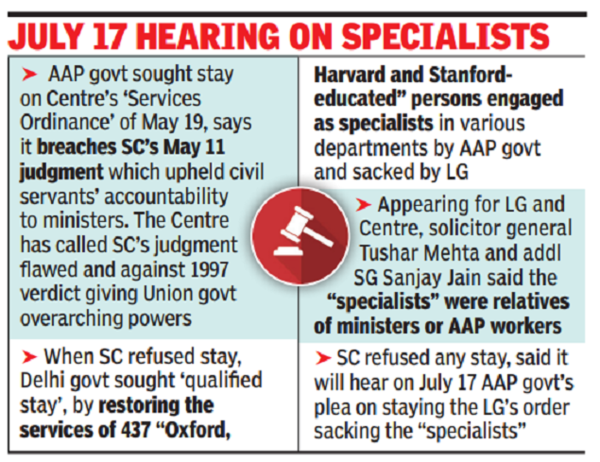Delhi Ordinance: Supreme Court refuses to grant interim stay, issues notice to the Center
Appearing for Delhi government, senior advocate AM Singhvi repeatedly requested a bench of CJI DY Chandrachud and Justice PS Narasimha to stay operation of the ordinance, arguing that the legislation breached the SC five-judge bench’s May 11 judgment upholding the principle of triple chain command — civil servants being accountable to ministers, who in turn being accountable to Parliament/assembly and the latter representing the will of the people, with regard to administration of the National Capital Territory.
When the bench said it would not stay the ordinance till it conducted a detailed hearing, Singhvi sought a “qualified stay” by seeking restoration of services of 437 “Oxford, Harvard and Stanford-educated” people engaged as specialists in various departments by the AAP government and who have been sacked by the lieutenant governor.

For the Union government and the LG, solicitor general Tushar Mehta and additional solicitor general Sanjay Jain said these “so-called specialists” were all relatives of ministers in the Delhi government or purely AAP workers appointed without following any recruitment process or advertisement for public participation.
However, the bench agreed to hear on July 17 the AAP government’s plea for staying the LG’s order sacking the “specialists”. The SG said the AAP government had made it a habit to rush to the SC for every case, completely bypassing the jurisdiction of Delhi High Court.
In a related case, the CJI-led bench had on July 4 recorded Singhvi’s statement that the AAP government would not administer oath to central government-appointed Delhi Electricity Regulatory Commission chairperson Justice Umesh Kumar and sought response from the Centre on the UT government’s petition challenging the validity of Section 45D introduced in NCTD Act through the May 19 ordinance, that allowed the Union government to appoint chairpersons to all statutory bodies.
The challenge to the ordinance in the SC is the latest turn in the Centre-Kejriwal government fight over who gets to control the bureaucracy in the city.
Hours before issuance of the ordinance on May 19, the Union government had moved the SC seeking review of its May 11 judgment which had ruled that though Delhi was a unique Union Territory, the elected government here had both legislative and executive power over transfer and posting of bureaucrats.
After keeping services out of reach of the Kejriwal government through the ordinance, the Centre in its review petitions said that the May 11 judgment was flawed and flew in the face of a nine-judge bench judgment of the SC in 1997 which had ruled that Delhi, despite having an assembly, remained a UT, and argued that the Union government would retain overarching control over many subjects, including services.
Delhi CM Arvind Kejriwal had embarked on a tour of states ruled by parties other than BJP to garner support against the ordinance to torpedo it in Rajya Sabha. After that, the city government moved a writ petition in the SC challenging its constitutional validity. An ordinance has a lifespan of six months and requires ratification by Parliament within that period.
Watch Supreme Court issues notice to Centre, declines to stay operation of services ordinance
#Delhi #Ordinance #News #Supreme #Court #asks #Centre #justify #services #ordinance #India #News

Leave a Reply